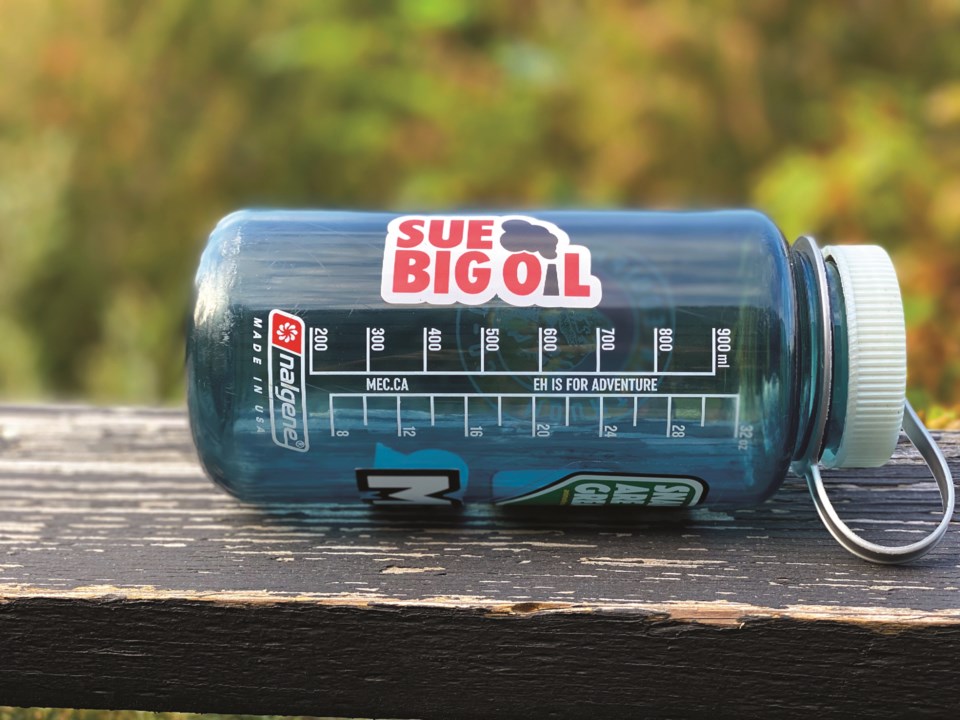No movement is legit until it circulates identity collateral. So, when local e-bike entrepreneur and climate advocate Dave Heighway hands me a “SueBigOil” sticker, I feel fully licensed for silently cheering the new rash of lawsuits aimed at the incalculable harm wrought by the criminal malfeasance of the oil-and-gas industry.
“Courts aren’t where I want to see the battle to get oil companies to pay their fair share of climate change effects fought—I don’t think anybody does—but it’s the last resort,” says Heighway, who is currently organizing to recruit local volunteers and collect signatures on a petition for Whistler council to join other B.C. municipalities (notably Vancouver) who’ve declared intentions to set aside $1/citizen for a group legal fund.
Not everyone agrees with such earmarking, but as Andrew Gage, lawyer with the group behind the project (suebigoil.ca), West Coast Environmental Law, asked on Twitter: “Do the people upset re: Vancouver spending $1 per resident on a joint class action to recover #climatecosts understand that the city needs to spend $1 BILLION for protection against rising sea levels (> $1500/resident) + more for other climate costs?”
They should. And West Coast has a de facto plan to get at least some of that cash from Big Oil. Fossil fuels have clearly benefitted modern society, “but we’re now realizing that there were enormous deferred costs to our communities,” they write. “In a society dependent on fossil fuels, we’re all responsible for climate change… Asking companies to bear some of those costs is not about blaming the industry or denying individual responsibility—it’s about acknowledging our shared responsibility.”
Personally, I’m up for more blaming, given that industry has: a) known for decades that burning fossil fuels causes the heat waves, wildfires and flooding we’re now paying billions for in B.C.; b) funded disinformation campaigns designed to mislead the public on science; and c) lobbied vigorously against laws and international agreements to fight climate change.
“Fossil fuel giants have captured governments and banks, extracting mega-profits while the world burns,” says Avi Lewis, Sea to Sky NDP candidate in the recent federal election. “It’s time to sue Big Oil.”
Given the industry’s global track record and, in this country, continued funding of misinformation campaigns while nose-thumbing emissions-reduction legislation, it would seem British Columbians agree. In a recent poll, 73 per cent believed climate change was harming them or people they knew, or would do so within a decade, and 69 per cent supported local governments working together to make oil companies pay their share of increasing climate-change costs currently shouldered entirely by the taxpayer. Yes, you and I are shelling out for heat-dome deaths, catastrophic flooding on both coasts, increasing storm damage and wildfires across the country, and disaster-cash donations to other nations while oil companies rake in record profits—an estimated $152 billion in Canada alone in 2022 according to the Pembina Institute—their most profitable year ever!
Let that sink in while we look at some history.
In 1896, Swedish Nobel laureate Svante August Arrhenius first estimated the extent to which increasing atmospheric CO2 is responsible for increasing surface temperatures on Earth, suggesting humans might contribute. In the 1960s, American scientist Charles David Keeling recorded steadily rising levels of CO2 at Hawaii’s Mauna Loa Observatory, confirming Arrhenius’s proposition. Science was onto the problem, but what about Big Oil? Well, they were, too.
At a 1959 petroleum conference at Columbia University, scientist Edward Teller introduced the problem of global warming to industry execs. “Whenever you burn fuel,” he explained, “you create carbon dioxide… Its presence in the atmosphere causes a greenhouse effect.” If the world kept using fossil fuels, he warned, icecaps would melt and sea levels would rise. At a 1965 meeting of the American Petroleum Institute, its president, Frank Ikard, detailed a recent report on pollution. “One of [its] most important predictions… is that carbon dioxide is being added to the Earth’s atmosphere by the burning of coal, oil, and natural gas at such a rate that by the year 2000 the heat balance will be so modified as possibly to cause marked changes in climate.”
By the 1970s, oil companies were studying atmospheric CO2 themselves. When they saw these predictions were spot on, denial, coverups and misdirection began. Fast forward to today, and 90 entities—mostly fossil-fuel companies—are responsible for 2/3 of the historical emissions that have raised atmospheric CO2 from 280 to 420 ppm in 200 years; the four largest oil companies, fully cognizant of the consequences of their actions, accounting for 14 per cent of the total. A solid reason to sue the snot out of them.
In 2019, 28 law professors from across Canada wrote an open letter to B.C. governments encouraging them to sue fossil-fuel companies: “Such a case would be novel in the same way that the first court cases demanding recognition of Indigenous rights or gay marriage, or claiming compensation against tobacco or asbestos companies, were novel ... In our view, existing legal principles could form a solid basis for a lawsuit filed by a local government against fossil fuel companies for local climate costs.”
It’s not without precedent, as dozens of such suits—many launched by young people concerned about their futures—proceed around the world. Notably, in the Netherlands, NGO Millieudefensie recently won a lawsuit against Shell for its role in causing climate change; in the U.S., 20 local governments plus three states are suing fossil-fuel companies. And history is on the plaintiff’s side: Big Tobacco, Big Asbestos, and Big Pharma all learned that if your products cause massive harm, you’ll eventually pay the piper.
“At the moment this is a bite-sized movement, and you can expect it to grow,” says Heighway. And not just because of the stickers.
A soft launch meet-and-greet event for SueBigOil Whistler takes place on October 22 from 4:30 to 6 p.m. in Alpine. Contact Dave at [email protected] for details.
Leslie Anthony is a science/environment writer and author who holds a doctorate in connecting the dots.




